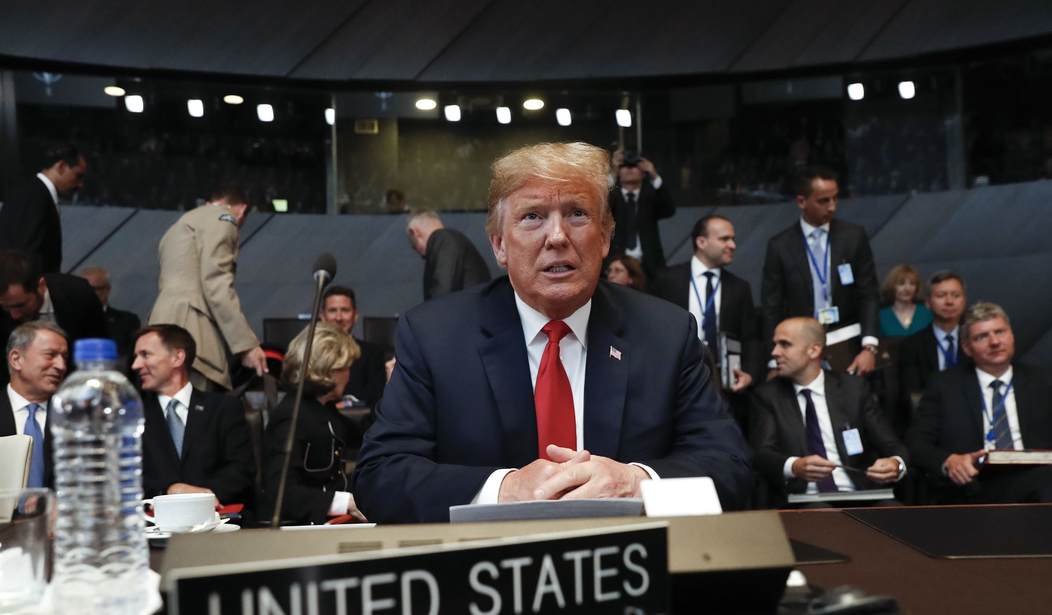During the recent NATO summit meeting, a rumbustious Donald Trump tore off a thin scab of niceties to reveal a deep and old NATO wound -- one that has predated Trump by nearly 30 years and goes back to the end of the Cold War.
In an era when the Soviet Union and the Warsaw Pact are now ancient history, everyone praises NATO as "indispensable" and "essential" to Western solidarity and European security. But few feel any need to explain how and why that could still be so.
Does NATO still protect the West? Does it prevent destructive European feuding? Does it ensure the postwar global order of free trade, commerce, travel and communications? And is NATO -- or the United States and its leadership of NATO -- the real reason there has not been a World War III or a return to global tribalism and chaos?
NATO's post-Cold War expansion to 29 nations and to the border of Russia meant the alliance became more expansive at the very time the old existential Soviet threat disappeared. Larger membership tended to weaken common ties, even as common dangers disappeared.
The result was that the idea of NATO membership became more important to the countries that are part of it than the reality and responsibility of actual military readiness.
Polls show that in most NATO countries, the idea of fighting on behalf of another country receives scant public support. The notion that the Dutch would march into Estonia to save its capital, Tallinn, from Russia is a cruel joke.
Recommended
NATO's 21st-century problem is not the United States, which provides a large percentage of its wherewithal, but Germany. As the most populous and most affluent of European nations, Germany still insidiously dominates Europe as it has since its inception in 1871.
Berlin sends ultimatums to the indebted Southern European nations. Berlin alone tries to dictate immigration policy for the European Union. Berlin establishes the tough conditions under which the United Kingdom can exit the European Union. And when Berlin decides it will not pony up the promised 2 percent of GDP for its NATO contribution, other laggard countries follow its example. Only six of the 29 NATO members (other than the U.S.) so far have met their promised assessments.
Germany's combination of affluence and military stinginess is surreal. Germany has piled up the largest trade surplus in the world at around $300 billion, including a trade surplus of some $64 billion with its military benefactor, the United States, yet it is poorly equipped in terms of tanks and fighter aircraft.
Ostensibly, NATO still protects Europe from Vladimir Putin's Russia, just as it once kept the Soviet Red Army out of West Germany. But over the objections of its Baltic neighbors and the Ukraine, Germany just cut a gas pipeline deal with Russia -- the purported threat for which its needs U.S.-subsidized security.
Stranger still is Germany's growing animosity toward the United States. At the end of the Obama administration, 57 percent of Germans expressed a positive view of America in a Pew poll. That figure dropped to 35 percent in the first year of the Trump administration. A recent poll reveals that Germans see Putin's Russia as more trustworthy than the United States.
Why is Germany the most anti-American of NATO members?
Germany started and lost two world wars -- and was defeated due in part to the late entrance of the United States. The unification of Germany brought millions of East Germans into the west, many of them raised under a communist system that blamed the U.S. for the world's ills.
When Russia will be providing more than half of Germany's natural gas instead of threatening to fire tactical nuclear missiles at Berlin, the U.S. military is no longer deemed so important to German security.
Add up all these disparate realities and the real crisis of NATO becomes clearer. The alliance's most affluent and dominant European member sets a pernicious example by failing to meet its alliance obligations.
Germany demands that the United States continue to be the largest funder of NATO and yet has an unfavorable view of America -- and an increasingly favorable view of NATO's supposed common threat, Russia.
Other fearful European NATO nations are used to being dominated by Germany and either keep quiet or follow its lead.
This is the NATO that Trump inherited and that he tried to shake up with his customary art-of-the-deal antics. Trump may be loud and uncouth, but his argument that NATO countries need to pay more money for their shared alliance's self-defense is sound. If successful, it would lead to a stronger NATO.
In contrast, German Chancellor Angela Merkel sounds customarily professional and diplomatic as she continues to weaken the alliance and pursue German commercial and financial interests at the expense of fellow NATO members.

























Join the conversation as a VIP Member